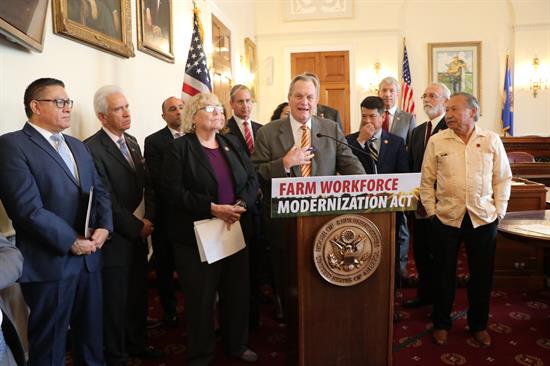Farm Workforce Modernization Act
Mike Simpson (R-ID-02) joined Reps. Zoe Lofgren (D-CA-19) and Dan Newhouse (R-WA-04), in re-introducing the Farm Workforce Modernization Act to provide a compromise solution for American agriculture. The Farm Workforce Modernization Act, which was first introduced and passed in the House of Representatives with strong bipartisan support in 2019, makes meaningful reforms to the H-2A agricultural guessworker program and creates a first-of-its-kind, merit -based visa program specifically designed for the nation's agricultural sector. The bill passed the House of Representatives again in 2021 with bipartisan support and now awaits further action by the U.S. Senate “The men and women who work America’s farms feed the nation. But, farmworkers across the country are living and working with uncertainty and fear, contributing to the destabilization of farms across the nation,” said Rep. Lofgren. “Our bill offers stability for American farms by providing a path to legal status for farmworkers. In addition, the Farm Workforce Modernization Act addresses the nation’s future labor needs by modernizing an outdated system for temporary workers, while ensuring fair wages and workplace conditions.” “When I speak to farmers and ranchers across the country, labor is often their number one concern. Our nation’s agriculture industry is diverse and flourishing, but producers are in desperate need of a legal and reliable workforce,” said Rep. Newhouse. “As a third-generation farmer, I understand the invaluable contributions made by farmworkers to American agriculture, and we must modernize our guest worker program to work for farmers, ranchers, and farmworkers in the 21st Century. The Farm Workforce Modernization Act offers a strong, bipartisan workforce solution to provide certainty to both farm owners and workers through an accessible, employment-based program. This bill is the solution our agricultural industry needs.” “My constituents have been asking me to fix our immigration laws since my first day in Congress,” said Rep. Simpson. “There is perhaps no more important facet of immigration reform for Idaho and its economy than the agriculture workforce. I am proud to introduce the Farm Workforce Modernization Act alongside a bipartisan coalition of members in the first step towards solving this problem. Getting our farmers’ employees right with the law will provide economic stability to our rural communities and make our country safer by creating a legal, merit-based agriculture immigration system that allows our valuable law enforcement resources to focus on the bad actors.” The bill has garnered the wide-spread support of nearly 250 agriculture groups and labor organizations. “After months of negotiations, the UFW and UFW Foundation are enthusiastic about passing legislation that honors all farm workers who feed America by creating a way for undocumented workers to apply for legal status and a roadmap to earn citizenship in the future without compromising farm workers’ existing wages and legal protections. Understanding that compromise is required to meaningfully improve the lives of immigrant field laborers, it is our hope this will be the first time the House of Representatives, under the leadership of either party, will approve an agricultural immigration bill,” said Arturo S. Rodriguez, President Emeritus of United Farmworkers & Spokesperson of UFW Foundation. “We have supported numerous efforts to address dairy’s acute labor needs. Passing legislation in the House is a critical step in the process. We urge the Senate to work with us on this important issue so we can get an ag worker bill across the finish line in this Congress,” said Jim Mulhern, President and CEO of National Milk Producers Federation (NMPF). “The bipartisan Farm Workforce Modernization Act provides an important starting point for badly needed improvements to agriculture immigration policy. NMPF would like to thank Chairwoman Lofgren and Congressman Newhouse for their bipartisan leadership, and we look forward to continuing to work with them as this important legislation moves forward.” “The legislation points the way towards achieving many of the long-standing immigration reform goals of NCFC and others in agriculture. While there are provisions that are problematic, on balance it is a good starting point for the legislative process. It provides an opportunity to obtain an earned legal status for the current workforce in agriculture; it codifies many of the reforms that the Trump Administration has made to the current H-2A program and provides some certainty over labor costs; and it authorizes a limited number of year-round visas for those farmers with year-round labor needs, such as those in dairy and livestock,” said Chuck Conner, President & CEO of National Coalition of Farm Cooperatives. “We look forward to working with Chairwoman Lofgren, Congressman Newhouse and the other co-sponsors as the bill moves forward to ensure that the bill leads to a solution that ensures agriculture producers have access to a legal and stable workforce.” Background: Farmers and ranchers across the United States are in desperate need of a high-quality, reliable workforce, and the current H-2A guestworker program is in need of meaningful, bipartisan reform. The Farm Workforce Modernization Act creates a workforce solution for America’s agriculture industry by providing stability, predictability, and fairness to one of the most critical sectors of our nation’s economy. The bill will:
### |



